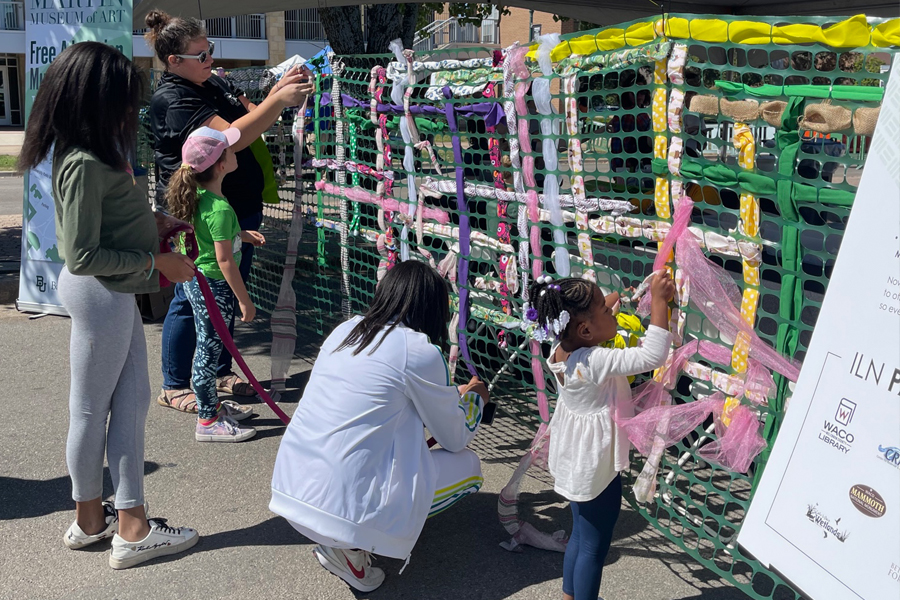Partnerships
Informal Learning Network
The Informal Learning Network of Waco is a group of organizations working to make a difference in the lives of area community members. We want you to get involved!
Mark Your Mark in the Community: Weaving Together
The Martin Museum has partnered with local organizations to weave ourselves together! This community weaving project will be traveling to other locations in the Informal Learning Network, so everyone can enjoy it, add our own voices to it and come together.
If you would like to learn more about some of the programs available from our network, scroll down to read how you can get involved, learn, or volunteer.
- This weaving project began at The Waco Cultural Arts Fest, October 1st-2nd in downtown Waco, Texas.
Learning Network Partners:
Waco-McLennan County Library
The Waco-McLennan County Library offers a wide variety of programs and services to the community in each of their locations. The Library connects individuals to quality and diverse resources for education, information, and recreation.
Waco Wetlands
The Lake Waco Wetlands Project was created as a result of the Lake Waco Pool Rise to help replace wildlife habitat areas that were destroyed due to the raising of the water and to also assist with water quality issues associated with the North Bosque River.
The City of Waco Water Utilities Department, the U.S. Army Corps of Engineers Waco Lake and Baylor University have successfully collaborated into a partnership to help create this 180-acre wetland ecosystem, and at the same time, a 6,000 square foot Research and Education Center was constructed on site. The City of Waco Wetland focuses on developing and providing for the public, outreach programs relating to aquatic and wetland ecosystems. Several schools have participated in wetland field trip presentations and volunteer opportunities that focus on wetland ecosystems. Various activities include, (but not limited to): birding and native plant hikes, aquatic insect seining, and hands on wetland plantings, water quality testing, crafting wetland animal tracks, just to name a few.
The Lake Waco Wetland provides a valuable opportunity for the public to obtain information about the importance of wetlands and water conservation issues.
Texas Rangers Museum
Founded in 1964 as a state museum, the Texas Ranger Hall of Fame and Museum tells the story of the Texas Rangers and their role in law enforcement and Texas history. The museum cares for around 20,000 artifacts, spanning from the earliest Ranger badge made in the 1880s to modern crime scene investigation technology. Over four million people have visited the museum, but the most important guests are the school children who learn about this unique heritage.
Waco Mammoth National Monument
The Waco Mammoth National Monument is a paleontological site and museum in Waco, Texas where fossils of 24 Columbian mammoths and other mammals from the Pleistocene Epoch have been uncovered.
Scientists from Baylor University and many other institutions have conducted research on such topics as the age of the fossils, what plants the animals ate, and the circumstances under which they were trapped and buried. How the mammoths died is still a mystery. Click the link above to learn more.
The National Park Service hosts Volunteers In Parks. Volunteers at Waco Mammoth can serve as tour guides and hospitality hosts on a long-term basis, or volunteers can help with short projects like hiking trail and grounds maintenance and their annual festival help.
Better Living for Texans
Better Living for Texans (BLT) is a nutrition education program for adults and children that are SNAP participants and SNAP eligible. The BLT program helps people make healthy meals, improve their physical fitness, save money at the grocery store, grow their own foods, and adopt better food safety habits.
Cameron Park Zoo
Do you enjoy being outside and teaching others about nature and preserving biological diversity? Get involved in wildlife conservation and research. Live your passion for animals and the natural world by volunteering at Cameron Park Zoo.
We are looking for people who are passionate about Cameron Park Zoo and our animals. People from all walks of life are welcome! Prior zoo experience isn’t necessary; we provide the training. Adult volunteers must commit to 48 hours a year. Unless otherwise specified, volunteers must be at least 18 years of age. All volunteers must submit an application, go through the Volunteer Orientation, and pass a background check. Volunteers who are working with animals are required to have a tuberculosis test.
You’ll enjoy being part of the behind-the-scenes work while making a real contribution to our mission by spreading our conservation message, helping care for our animal and plant collections, and educating visitors of all ages. Volunteers are valued members of the Cameron Park Zoo team.
CRASR (Center for Reservoir and Aquatic Systems Research)
A research and education partnership between Baylor University and the City of Waco focused on aquatic resources. This Center is a natural outflow of many years of collaboration between these institutions as over the years Baylor and the City have each developed significant water-related expertise and capabilities.
Aquatic resources are essential to both ecological function and a healthy, prosperous society. CRASR scientist are conducting research in diverse areas that will help us make better management decisions in support of both humanity and nature. Our findings are clarifying our understanding of the natural function of aquatic ecosystems and how human activities are impacting those functions. Eutrophication, priority pollutants and climate change are just some of the many facets of research being conducted in our labs.
Waco Water
The City of Waco Public Works offers educational programs and other informal learning opportunities. Interested in getting involved to protect our local streams, rivers, and lakes? Joining our local Texas Stream Team chapter allows you the opportunity to gain valuable hands-on experience while helping us monitor our waterways on a monthly basis. In addition to our region, basic water quality data is collected at sites across Texas and contributes to an overall picture of our state’s water quality.
